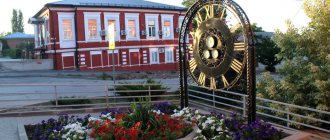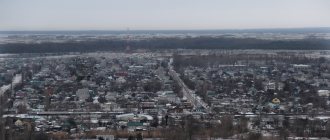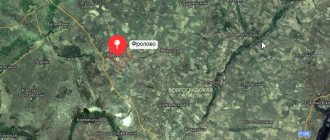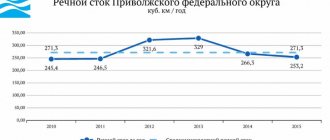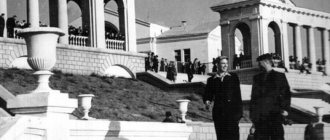City in Volgograd Oblast, Russia
| Surovikino Surovikino | |
| Town[1] | |
| Flag Coat of arms | |
| Location of Surovikino | |
| Surovikino Location of Surovikino Show map of Russia Surovikino Surovikino (Volgograd region) Show map of Volgograd region | |
| Coordinates: 48°36′N 42°51'E / 48.600°N W. 42.850 ° E. / 48.600; 42.850Coordinates: 48°36′N 42°51'E / 48.600°N W. 42.850 ° E. / 48.600; 42.850 | |
| A country | Russia |
| Federal subject | Volgograd region[1] |
| Administrative region | Surovikinsky district[1] |
| City of district significance | Surovikino[2] |
| Based | 1900 |
| City status from | 1966 |
| Height | 40 m (130 ft) |
| population (2010 Census)[3] | |
| • General | 20,533 |
| • Evaluate (2018)[4] | 18,685 (-9%) |
| Administrative status | |
| • Capital from | Surovikino district[1], city of regional significance Surovikino[2] |
| Municipal status | |
| • Municipal district | Surovikinsky municipal district[5] |
| • Urban village | Urban settlement Surovikino[5] |
| • Capital from | Surovikino municipal district[5], urban-type settlement Surovikino[5] |
| Timezone | UTC + 4 (MSK + 1 [6]) |
| Postal code(s)[7] | 404411–404415 |
| OKTMO I WOULD | 18653101001 |
| Web site | network.archive.org/ Internet/20131105060842/ https:// www.surovikino.RU/ |
Surovikino
(Russian: Surovikino) is a town and the administrative center of Surovikino District in Volgograd Oblast, Russia, located at the confluence of the Chir and Don Rivers (Tsimlyanskoye Reservoir), 154 km (96 mi) west of Volgograd, the administrative center of the region. Population: 20,533 (2010 Census);[3]20,338 (2002 Census);[8]18,336 (1989 Census).[9]
Location
Surovikino is a regional center. Geographically, the town is located 133 kilometers from the city of Volgograd. There is a railroad track and a federal highway running through this town.
The length of the city from north to south is about 3.5 kilometers, and from west to east - about 9 kilometers. Nearest rivers: Liska, Chir, and Dobraya. The area is rich in sand and clay deposits.
The town is literally surrounded by the “Green Ring” - artificial plantings of acacias, spruce trees and magnificent meadows.
Population
Initially, the settlement consisted of about 5 - 6 households, in which about fifty people lived. But already in the second half of the 19th century there were already more than 15 households, and the number of settlers was more than a hundred. Only in 1966 the village acquired city status.
As the economy developed, the population also increased. For example, in 1959 the number of residents was about 9,500 people, in 1989 - about 18 thousand, and in 2022 - 18.5 thousand people.
An excerpt characterizing Surovikino
“Oh, go to hell, all of you, to hell, to hell, to hell!” shouted the old count. - My head is spinning. - And he left the room. The Countess began to cry. - Yes, yes, mummy, very difficult times! - said Berg. Natasha went out with her father and, as if having difficulty understanding something, first followed him, and then ran downstairs. Petya stood on the porch, arming the people who were traveling from Moscow. Pawned carts still stood in the yard. Two of them were untied, and an officer, supported by an orderly, climbed onto one of them. - Do you know why? - Petya asked Natasha (Natasha understood that Petya understood why his father and mother quarreled). She didn't answer. “Because daddy wanted to give all the carts to the wounded,” said Petya. - Vasilich told me. In my opinion... “In my opinion,” Natasha almost suddenly screamed, turning her embittered face to Petya, “in my opinion, this is such disgusting, such an abomination, such... I don’t know!” Are we some kind of Germans?.. - Her throat trembled with convulsive sobs, and she, afraid to weaken and release the charge of her anger in vain, turned and quickly rushed up the stairs. Berg sat next to the Countess and comforted her with kindred respect. The Count, pipe in hand, was walking around the room when Natasha, with a face disfigured by anger, burst into the room like a storm and quickly walked up to her mother. - This is disgusting! This is an abomination! - she screamed. - It can’t be that you ordered. Berg and the Countess looked at her in bewilderment and fear. The Count stopped at the window, listening. - Mama, this is impossible; look what's in the yard! - she screamed. – They remain!.. – What’s wrong with you? Who are they? What do you want? - The wounded, that's who! This is impossible, mamma; this doesn’t look like anything... No, Mama, darling, this is not it, please forgive me, darling... Mama, what do we care about what we’re taking away, just look at what’s in the yard... Mama!.. This can’t be !.. The Count stood at the window and, without turning his face, listened to Natasha’s words. Suddenly he sniffed and brought his face closer to the window. The Countess looked at her daughter, saw her face ashamed of her mother, saw her excitement, understood why her husband was now not looking back at her, and looked around her with a confused look. - Oh, do as you want! Am I disturbing anyone? – she said, not yet suddenly giving up. - Mama, my dear, forgive me! But the countess pushed her daughter away and approached the count. “Mon cher, you do the right thing... I don’t know that,” she said, lowering her eyes guiltily. “Eggs... eggs teach a hen...” the count said through happy tears and hugged his wife, who was glad to hide her ashamed face on his chest. - Daddy, mummy! Can I make arrangements? Is it possible?.. – Natasha asked. “We’ll still take everything we need…” Natasha said. The Count nodded his head affirmatively at her, and Natasha, with the same quick run as she used to run into the burners, ran across the hall to the hallway and up the stairs to the courtyard. People gathered around Natasha and until then could not believe the strange order that she conveyed, until the count himself, in the name of his wife, confirmed the order that all carts should be given to the wounded, and chests should be taken to storerooms. Having understood the order, people happily and busily set about the new task. Now not only did it not seem strange to the servants, but, on the contrary, it seemed that it could not be otherwise, just as a quarter of an hour before it not only did not seem strange to anyone that they were leaving the wounded and taking things, but it seemed that it couldn't be otherwise. All the household, as if paying for the fact that they had not taken up this task earlier, busily began the new task of housing the wounded. The wounded crawled out of their rooms and surrounded the carts with joyful, pale faces. Rumors also spread in the neighboring houses that there were carts, and the wounded from other houses began to come to the Rostovs’ yard. Many of the wounded asked not to take off their things and just put them on top. But once the business of dumping things had begun, it could not stop. It didn't matter whether to leave everything or half. In the yard lay untidy chests with dishes, bronze, paintings, mirrors, which they had so carefully packed last night, and they kept looking for and finding an opportunity to put this and that and give away more and more carts. “You can still take four,” said the manager, “I’m giving away my cart, otherwise where will they go?” “Give me my dressing room,” said the countess. - Dunyasha will get into the carriage with me. They also gave away a wardrobe wagon and sent it two houses away to pick up the wounded. All the household and servants were cheerfully animated. Natasha was in an enthusiastically happy revival, which she had not experienced for a long time. -Where should I tie him? - people said, adjusting the chest to the narrow back of the carriage, - we must leave at least one cart. - What is he with? – Natasha asked. - With the count's books. - Leave it. Vasilich will clean it up. It is not necessary. The chaise was full of people; doubted about where Pyotr Ilyich would sit. - He's on the goat. Are you a jerk, Petya? – Natasha shouted. Sonya kept busy too; but the goal of her efforts was the opposite of Natasha’s goal. She put away those things that were supposed to remain; I wrote them down, at the countess’s request, and tried to take with me as many as possible. In the second hour, the four Rostov carriages, loaded and stowed, stood at the entrance. The carts with the wounded rolled out of the yard one after another. The carriage in which Prince Andrei was carried, passing by the porch, attracted the attention of Sonya, who, together with the girl, was arranging seats for the countess in her huge tall carriage, which stood at the entrance. – Whose stroller is this? – Sonya asked, leaning out of the carriage window. “Didn’t you know, young lady?” - answered the maid. - The prince is wounded: he spent the night with us and is also coming with us. - Who is this? What's the last name? – Our very former groom, Prince Bolkonsky! – sighing, answered the maid. - They say he is dying. Sonya jumped out of the carriage and ran to the Countess. The countess, already dressed for the trip, in a shawl and hat, tired, walked around the living room, waiting for her family in order to sit with the doors closed and pray before leaving. Natasha was not in the room. “Maman,” said Sonya, “Prince Andrei is here, wounded, near death.” He's coming with us. The Countess opened her eyes in fear and, grabbing Sonya’s hand, looked around. - Natasha? - she said. For both Sonya and the Countess, this news had only one meaning at first. They knew their Natasha, and the horror of what would happen to her at this news drowned out for them all sympathy for the person they both loved. – Natasha doesn’t know yet; but he’s coming with us,” said Sonya. - Are you talking about death? Sonya nodded her head. The Countess hugged Sonya and began to cry. "God works in mysterious ways!" - she thought, feeling that in everything that was done now, an omnipotent hand, previously hidden from people’s view, began to appear.
Story
Over the course of their history, the residents of Surovikino have seen a lot. Fierce battles between E. Pugachev and S. Razin with government troops took place here; the freedom of the Don steppes at all times left its mark on the events that developed here.
At the very beginning of the 20th century, the Surovikino railway station was inaugurated in the village. It was named after the neighboring farm, which bore the name of its founders, the Surovikins.
Revolutionary events, the period of the Civil War and the Great Patriotic War were associated with enormous shocks and hardships for the local population. It was here that the advanced units that took part in the bloody battle for Stalingrad were formed.
Mentions of this city can be found in the works of A.S. Pushkina, M.A. Sholokhova, A.S. Tolstoy and other famous poets and writers.
Surovikinsky district, Volgograd region
Surovikinsky district is one of several municipal districts of the Volgograd region of Russia. It is located in the southwestern part of the Volgograd region on the border with the Rostov region. Until 1937, this area was called Kaganovichsky, and subsequently became known as a derivative form of the name of the administrative center of the Surovikino farm. Now Surovikino rightfully has the status of a city. By the way, the name of the settlement comes from the names of the first inhabitants who settled here in the middle of the 18th century.
Since 2004, the district has municipal status. Today it includes 9 rural and 2 urban settlements.
District infrastructure
Most of the enterprises in the city of Surovikino are focused on the processing and production of agricultural products. This is partly due to the terrain features of this area. It is located on a plain at an altitude of approximately 180 meters above sea level. Therefore, food melons are cultivated here, gardens are grown and livestock is raised. In addition, food industry enterprises operate directly in the city: butter factories, a confectionery factory, and a sausage factory.
The transport system is quite well developed. The Kamensk-Shakhtinsky - Volgograd highway passes through the Surovikinsky district. The railway was built here back in 1900, when the railway station was named after the settlement of Surovikino. Today the Volgograd-Likhaya line passes through the Surovikino station.
Natural conditions
Residents of the Surovikinsky district of the Volgograd region are lucky with natural conditions. On its territory there is part of the protected natural complex Sviridov Lakes, home to many species of rare birds and beautiful swans. This area has access to the large Tsimlyansk reservoir, which is also called the Tsimlyansk Sea. The city of Surovikino also boasts the stunning natural monument “Green Ring”, which is a ring planting of various trees from the north to the south of the city. One of the most popular tourist natural places, offering stunning views of these forests in combination with lakes, is the top of Kalinovskaya Mountain.
In general, these plantings and the weather in the Surovikinsky district allow local residents to enjoy the benefits of a mild continental climate. Winters in this region are without abnormal deviations; frosts up to 25 degrees below zero are considered normal; in summer you can enjoy outdoor recreation at temperatures of 25-30 degrees. In especially hot months (June, July) the heat reaches 40 degrees.
Locals
The location of the area has led to some diversity of nationalities in the local population. The website of the Surovikinsky district administration provides census statistics, which report that in addition to Russians, Kazakhs, Tatars, Chechens and Ukrainians live here. As in many other cities and regions of Russia, there are more women than men in percentage terms - 50.9% versus 41.9%.
